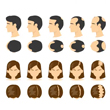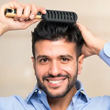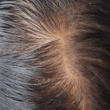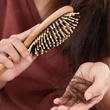Creatine and Hair Loss
Creatine is a powerful supplement that many bodybuilders and athletes use to build muscle. It is made of amino acids, and it helps the body transport energy to the muscles, which increases performance.
It is known to cause hair loss because it contains a lot of water, making the hair strands heavy and fragile. In addition, some users report brittle nails after using creatine supplements for a long time or those who combine it with caffeine or ephedrine products.
What is Creatine? 1,2
Creatine is naturally synthesized in the human body from amino acids primarily found in meats and fish. Bodybuilders generally take Creatine as a supplement to boost their performance and build muscles.

Recreational and professional athletes use Creatine to improve their performance. It helps them to run faster, swim longer and lift heavier weights. Bodybuilders and other athletes take Creatine before and after workouts to increase the supply of phosphocreatine in their muscles, which leads to more significant gains in muscle mass and strength.
How Does Creatine Work? 3
Creatine works on both short-term and long-term muscle growth.
Short-term: When you take Creatine, your muscles will hold more water and become temporarily larger. This is due to the extra Creatine you're taking in. The water helps your muscles grow and recover faster, but it leaves your body within a day or two of finishing a loading phase, so don't expect long-term size gains from it.

Long-term: When you take Creatine consistently over time, your muscles become accustomed to having the extra water inside them. They don't grow quite as large when this happens, but they can stay filled with water for more extended periods without becoming tired. Over time, this leads to greater muscle size and strength gains. Studies have shown that creatine supplements effectively improve overall performance when combined with resistance training, resulting in more significant gains in lean muscle mass and strength when combined with a workout program that includes weights or other weight-bearing exercise equipment.
Does Creatine Cause Hair Loss? 4
Don't be alarmed about hair loss from taking Creatine supplements. Be aware of what might be causing your hair to fall out besides the Creatine.
Creatine supplements can cause hair loss in some people. Creatine is a popular supplement among bodybuilders and athletes, and it's marketed as a way to improve performance in high-intensity activities like weightlifting.
If you've been taking creatine supplements and notice that your hair is thinning or falling out, you're not alone. Creatine can cause hair loss in some people. However, there are other causes of hair loss that may be related to creatine supplementation.

It is reported that some people taking Creatine as a supplement may experience hair loss as a side effect. However, it should be noted that many of these people were already experiencing this problem before taking the supplement. It is essential to know that other factors might cause hair loss besides just creatine use.
How Can You Prevent Hair Loss From Creatine? 5
Be aware of the safety levels and the associated side effects before increasing the dosage of Creatine.
It can take several months to notice any hair loss. You may start shedding more than average after a few weeks of taking Creatine, but it could take as long as six months for your hair loss to become noticeable. Anything that stresses your body — including stress and fatigue — can trigger the release of hormones that affect hair growth and cause hair loss. This can go away once you stop taking creatine supplements.
Adequate protein in your diet will help reduce the amount of hair you lose while taking creatine supplements. If you're not getting enough protein in your diet, you may be more susceptible to hair loss from taking vitamin supplements like Creatine.
People take vitamin supplements because their diets aren't adequate or healthy enough to provide their bodies with all the nutrients they need without supplementation. Exposure to sunlight and certain chemicals in standard household products like shampoo and conditioner can also cause hair loss.
Taking care of yourself means getting enough sleep, eating well, and exercising regularly. Be mindful of how severe any side effects are when you start taking creatine supplements, and if they persist after three weeks, seek medical advice.
Find the Right Balance Between Nitrate and Niacin 6
Supplement your diet with multivitamins that can regulate hair growth and, in turn prevent hair loss.
Supplementing with Creatine requires an increased amount of niacin. If you are concerned about hair loss, make sure your multivitamin has a higher level of niacin than usual.
Nitrate is another vitamin that helps prevent hair loss. It can be found in many vegetables and processed meats. Nitrates convert to nitric oxide in the body, which contains blood vessels from constricting while keeping them open to deliver nutrients to cells that need them.
If you have been experiencing hair loss, using a multivitamin should help reduce or eliminate your hair loss issues by ensuring you stay well-nourished and energized while also providing your body has all the vitamins it needs, including nitrate and niacin.
Consult a Doctor or Your Personal Trainer 7
Know about the minimum dosage and age requirements before consuming Creatine which can prove harmful to your body in the long run.
It is used by many athletes, especially those in strength training, as it helps build strength and endurance with limited side effects. It also helps with weight gain and fat reduction. So, if you have been looking for a supplement that will help you increase your power and energy levels, then Creatine might be the solution for you.
However, there is a downside to Creatine as well. Some people have reported experiencing hair loss due to its use.
This could be because Creatine increases the production of a hormone called dihydrotestosterone (DHT). DHT causes hair loss by shrinking the hair follicles located at the top of your scalp. This eventually leads to male pattern baldness as the follicles shrink further and further until they finally stop producing hair.
Conclusion 8
Creatine is a great supplement to help with building muscle, but when taken over a long period of time, it can cause hair loss. You must pair Creatine usage with the appropriate hair care routine to maximize your results and minimize any risks associated with the supplements.
Myth Busters HairFall

Androgenetic Alopecia - Everything You Need To Know
Have you been experiencing excessive hair fall over a prolonged period of time? It could be an early sign of androgenetic alopecia. It is a hair loss disorder common in both genders and can lead to progressive thinning and even baldness in some patients if not caught and treated early.

How To Make Hair Grow Faster For Men
A head full of healthy hair is a matter of confidence. Hair has its own mechanism of growing and shedding, and it is when this mechanism is thrown off that growth is hindered. Especially in the case of males, hair growth faces a lot of hiccups that can easily be managed.

Female Pattern Baldness - Causes & Treatments
Have you suddenly noticed an increase in the number of hair strands on your pillow in the morning? Or is your ponytail getting thinner by day? Well, you might be suffering from female pattern baldness. While that does sound scary, identifying it early on is key to treating this condition effectively. So keep reading to know what this is, how you can identify it, and most importantly, what treatments you can avail of to get your beautiful lustrous hair back.

What Are The Reasons For Hairfall?
Almost everyone experiences some amount of hair thinning over the years. Shedding around 50 to 100 single strands of hair per day is considered normal. However, losing more than 150 strands a day, experiencing sudden thinning, or developing circular bald patches on your scalp are reasons for concern. Hair loss occurs when new hair doesn’t grow fast enough to replace the amount of hair you lose daily. Hair can fall due to various reasons, with hereditary hair loss and poor nutrition being the most common hair fall reasons.

Expert Approved Tips For Hair Growth
What can be more debilitating than seeing hundreds of hair strands shedding from your scalp every time you brush your hair? Also, excessive molting occurs during seasonal changes that can be very stressful for you. Although it’s okay to lose between 50-100 strands every day, according to the American Academy of Dermatology, the problem occurs when you start shedding more than normal. But that doesn’t mean you have to feel helpless as there are ways to grow your hair back. Even if you are coping with baldness or alopecia, certain hair growth tips from dermatologists can come to your rescue. Read on to discover how these tips can be your savior when abnormal hair fall problems are in sight.
Trending Videos
+ 8 Sources
'LMRC - GGI-CO-A2-DMA-300001252-300001252-WM-L21-704'
© 2021 Dr. Reddy’s Laboratories Ltd. All rights reserved.